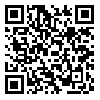Volume 3, Issue 1 (Summer 2017)
SJNMP 2017, 3(1): 43-52 |
Back to browse issues page
Download citation:
BibTeX | RIS | EndNote | Medlars | ProCite | Reference Manager | RefWorks
Send citation to:



BibTeX | RIS | EndNote | Medlars | ProCite | Reference Manager | RefWorks
Send citation to:
Vahabi B, Vahabi A, Sayyad S, Sayyadi M, Roshani D, Hajisahne S. The status of academic self-efficacy in the students of Kurdistan University of Medical Sciences and Islamic Azad University, Sanandaj Branch, 2015-16.. SJNMP 2017; 3 (1) :43-52
URL: http://sjnmp.muk.ac.ir/article-1-124-en.html
URL: http://sjnmp.muk.ac.ir/article-1-124-en.html
1- , sirvansayyad72@gmail.com
Abstract: (5197 Views)
Background & Aim: Educational self-efficacy implies a person's belief in his or her abilities in achieving educational goals and activities, the formation of which is influenced by various factors. The aim of this study was to determine the relationship between academic self-efficacy and demographic variables in students of Kurdistan and Islamic Azad universities of Sanandaj during the academic year of 2011-2012.
Materials & Methods: This cross-sectional study was carried out on 398 students of Kurdistan University of Medical Sciences and Islamic Azad University in Sanandaj during the academic year of 2015-2016. Sampling method was clustered. Demographic information form and academic self-efficacy questionnaire were used to collect data. Data were analyzed by SPSS software version 20 and descriptive and inferential statistics including mean, standard deviation, independent t-test and one-way analysis of variance were analyzed.
Results : The mean score of academic self-efficacy of students was 100 ± 64.41 ± 12.04. Two groups of students in Kurdistan University of Medical Sciences (64.49 ± 12.13) and Islamic Azad University of Sanandaj (11.57 ± 63.90) did not have a significant difference in self-efficacy scores (p=0.65). There was a significant difference between academic self-efficacy and mother's job (p = 0.004) and household economic status (p = 0.02).
Materials & Methods: This cross-sectional study was carried out on 398 students of Kurdistan University of Medical Sciences and Islamic Azad University in Sanandaj during the academic year of 2015-2016. Sampling method was clustered. Demographic information form and academic self-efficacy questionnaire were used to collect data. Data were analyzed by SPSS software version 20 and descriptive and inferential statistics including mean, standard deviation, independent t-test and one-way analysis of variance were analyzed.
Conclusion: The average score of students' academic performance is higher than average; variables such as having financial resources and parental education can be considered as effective factors in increasing student self-efficacy beliefs.
Type of Study: Research |
Subject:
General
Received: 2018/06/28 | Revised: 2019/06/30 | Accepted: 2019/10/24 | Published: 2019/10/24 | ePublished: 2019/10/24
Received: 2018/06/28 | Revised: 2019/06/30 | Accepted: 2019/10/24 | Published: 2019/10/24 | ePublished: 2019/10/24
Send email to the article author
| Rights and permissions | |
 |
This work is licensed under a Creative Commons Attribution-NonCommercial 4.0 International License. |








